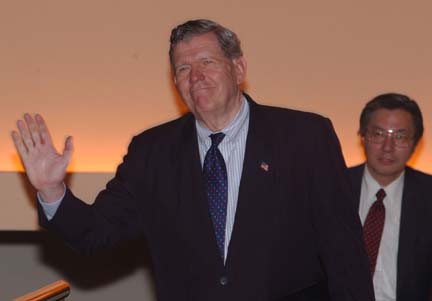
ASSOCIATED PRESS
James Kelly, assistant secretary of state for East Asian and Pacific affairs, waved yesterday before a meeting in Honolulu that addressed developments on the Korean peninsula.
N. Korea talks
open in Honolulu
HONOLULU >> Two days of private talks between second-echelon diplomats of the United States, Japan and South Korea over North Korea's nuclear weapons saber-rattling opened here yesterday with officials keeping mum publicly.
"Aloha," was all James Kelly, assistant U.S. secretary of state for East Asian and Pacific Affairs, would say as he walked past a small group of reporters to attend a private pre-talks lunch.
Yesterday was devoted to bilateral talks between Kelly and South Korea's deputy foreign minister, Lee Soo-hyuck, followed by a meeting between Lee and Mitoji Yabunaka, director general of Japan's Asian and Oceanian Affairs Bureau.
A bilateral session between Kelly and Yabunaka was scheduled for this morning, followed by all three sides meeting. They were expected to issue a joint statement this afternoon.
The closed-door meetings at the Hilton Hawaiian Village by the Trilateral Coordination and Oversight Group are part of a regular series of meetings held about four times each year.
Besides the standoff over North Korea's claim to have a nuclear weapons program, the talks here were expected to include whether to continue providing key parts for a U.S.-led project to build two nuclear reactors in North Korea.
The light-water reactors are the key element in a 1994 agreement in the U.S. efforts to keep the Korean peninsula nuclear-free by replacing the North's Soviet-designed, graphite-moderated reactors, which experts say produce greater amounts of weapons-grade plutonium.
North Korea recently declared the 1994 deal dead, but South Korean officials say the fact that the light-water reactor project is still alive shows the accord is salvageable.
Under the 1994 accord, North Korea agreed to freeze its suspected nuclear weapons facilities in return for the reactors, which are to be used to generate electricity, something North Korea's struggling economy needs.
The nuclear crisis flared in October when U.S. officials said North Korea admitted to running a secret nuclear weapons program in violation of the 1994 deal, raising regional tensions.
Earlier this week, North Korea threatened to build nuclear weapons as a deterrent to what it called a "hostile" U.S. policy. It was the communist government's first public declaration of its nuclear ambitions.
In an interview yesterday, Secretary of State Colin Powell said he takes North Korea at its word that it has developed nuclear weapons, but "we will not be frightened into taking action that would not be appropriate."
The Bush administration seeks a diplomatic solution, "and we feel confident that one can be found," he said.
Fueling tensions over North Korea's development of nuclear weapons is its missile development program, which includes the Taepodong-2, a two-stage rocket that some analysts believe could reach Hawaii.
